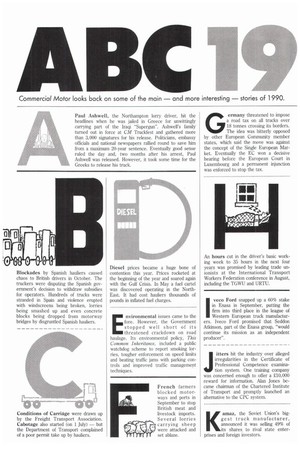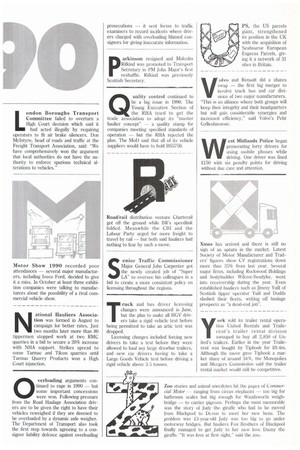ABC
Page 18

Page 19

If you've noticed an error in this article please click here to report it so we can fix it.
Commercial Motor looks back on some of the main — and more interesting — stories of 1990.
Paul Ashwell, the Northampton lorry driver, hit the headlines when he was jailed in Greece for unwittingly carrying part of the Iraqi "Supergun". Ashwell's family tuned out in force at CM Truckfest and gathered more than 3,000 signatures for his release. Politicians, embassy officials and national newspapers rallied round to save him from a maximum 20-year sentence. Eventually good sense ruled the day and, two months after his arrest, Paul Ashwell was released. However, it took some time for the Greeks to release his truck.
Blockades by Spanish hauliers caused chaos to British drivers in October. The truckers were disputing the Spanish government's decision to withdraw subsidies for operators. Hundreds of trucks were stranded in Spain and violence erupted with windscreens being broken, lorries being smashed up and even concrete blocks being dropped from motorway bridges by disgruntled Spanish hauliers.
Conditions of Carriage were drawn up by the Freight Transport Association. Cabotage also started (on 1 July) — but the Department of Transport complained of a poor permit take up by hauliers. Diesel prices became a huge bone of contention this year. Prices rocketed at the beginning of the year and soared again with the Gulf Crisis. In May a fuel cartel was discovered operating in the NorthEast. It had cost hauliers thousands of pounds in inflated fuel charges.
Environmental issues came to the fore. However, the Government stopped well short of its threatened crackdown on road haulage. Its environmental policy, This Common Inheritance, included a public watchdog scheme to report smoking lorries, tougher enforcement on speed limits and beating traffic jams with parking controls and improved traffic management techniques.
French farmers blocked motorways and ports in September to stop British meat and livestock imports. Several lorries carrying sheep were attacked and set ablaze. Germany threatened to impose a road tax on all trucks over 18 tonnes crossing its borders. The idea was bitterly opposed by other European Community member states, which said the move was against the concept of the Single European Market. Eventually the EC won a decisive hearing before the European Court in Luxembourg and a permanent injunction was enforced to stop the tax.
An hours cut in the driver's basic working week to 35 hours in the next four years was promised by leading trade unionists at the International Transport Workers Federation conference in August, including the TGWU and URTU.
Iveco Ford snapped up a 60% stake in Enasa in September, putting the firm into third place in the league of Western European truck manufacturers. Iveco Ford promised that Seddon Atkinson, part of the Enasa group, "would continue its mission as an independent producer".
Jitters hit the industry over alleged irregularities in the Certificate of Professional Competence examination system. One training company was concerned enough to offer a £10,000 reward for information. Alan Jones became chairman of the Chartered Institute of Transport and promptly launched an alternative to the CPC system.
Kamaz, the Soviet Union's biggest truck manufacturer, announced it was selling 49% of its shares, to rival state enterprises and foreign investors. London Boroughs Transport Committee failed to overturn a High Court decision which said it had acted illegally by requiring operators to fit air brake silencers. Don McIntyre, head of roads and traffic at the Freight Transport Association, said: "We have comprehensively won the argument that local authorities do not have the authority to enforce spurious technical alterations to vehicles."
Motor Show .1990 recorded poor attendances — several major manufacturers, including Iveco Ford, decided to give it a miss. In October at least three exhibition companies were talking to manufacturers about the possibility of a rival commercial vehicle show.
National Hauliers Association was formed in August to campaign for better rates, Just two months later more than 80 tippermen stopped work at two RMC quarries in a bid to secure a 20% increase with NHA support. Strikes spread to some Tarmac and Tilcon quarries until Tarmac Quarry Products won a High Court injunction_ Overloading arguments continued to rage in 1990 — but some important concessions were won. Following pressure from the Road Haulage Association drivers are to be given the right to have their vehicles reweighed if they are deemed to be overloaded by a dynamic axle weigher. The Department of Transport also took the first step towards agreeing to a consignor liability defence against overloading
prosecutions — it sent forms to traffic examiners to record incidents where drivers charged with overloading blamed consignors for giving inaccurate information.
parkinson resigned and Malcolm Rifkind was promoted to Transport Setretary in PM John Major's first reshuffle. Rifkind was previously Scottish Secretary.
Quality control continued to be a big issue in 1990. The Young Executive Section of the RHA tried to get the trade association to adopt its "master haulier concept" -a quality stamp for companies meeting specified standards of operation — but the RHA rejected the plan. The MoD said that all of its vehicle suppliers would have to hold BS5750.
Road/rail distribution venture Charterail got off the ground while BR's speedlink folded. Meanwhile the CBI and the Labour Party urged for more freight to travel by rail — but both said hauliers had nothing to fear by such a move.
Senior Traffic Commissioner Major General John Carpenter got the newly created job of "Super LA" to oversee his colleagues in a bid to create a more consistent policy on licensing throughout the regions.
Truck arid bus driver licensing changes were armounced in June, but the plan to make all HGV drivers take a rigid vehicle test before being permitted to take an artic test was dropped.
Licensing changes included forcing new drivers to take a test before they were allowed to haul any large drawbar trailers, and new car drivers having to take a Large Goods Vehicle test before driving a rigid vehicle above 3.5 tonnes.
PS, the US parcels giant, strengthened its position in the UK with the acquisition of Seabourne European Express Parcels, giving it a network of 31 sites in Britain.
Volvo and Renault did a shares swap — the first big merger to involve truck bus and car divisions of two major manufacturers. "This is an alliance where both groups will keep their integrity and their headquarters but will gain considerable synergies and increased efficiency," said Volvo's Pehr Gyllenhatiunar.
West Midlands Police began prosecuting lorry drivers for using mobile phones while driving. One driver was fined £150 with six penalty points for driving without due care and attention.
Xmas has arrived and there is still no sign of an upturn in the market. Latest Society of Motor Manufacturer and Traders' figures show CV registrations down more than 25% from last year. Several major firms, including Rockwood Holdings and bodybuilder Wilcox-Seadyke, went into receivership during the year. Even established hauliers such as Jimmy Yuill of Scottish tipper operator Yuill and Dodds slashed their fleets, writing off haulage prospects as "a dead-end job".
york sold its trailer rental operation United Rentals and Traderent's trailer rental division swooped to buy all 2,850 of United's trailers. Earlier in the year Trailerent was bought by Tiphook for .9.4m. Although the move gave Tiphook a market share of around 34%, the Monopolies and Mergers Commission said the trailer rental market would still be competitive.
Zoo stories and animal anecdotes hit the pages of Commercial Motor -ranging from circus elephants — too big for bathroom scales but big enough for Wandsworth weighbridge — to carrier pigeons. Perhaps the most memorable was the story of Judy the giraffe who had to be moved from Blackpool to Devon to meet her new beau. The problem was 13-year-old Judy was too big to go under motorway bridges. But hauliers Fox Brothers of Blackpool finally managed to get Judy to her new love Danny the giraffe. "It was love at first sight," said the zoo.
























































